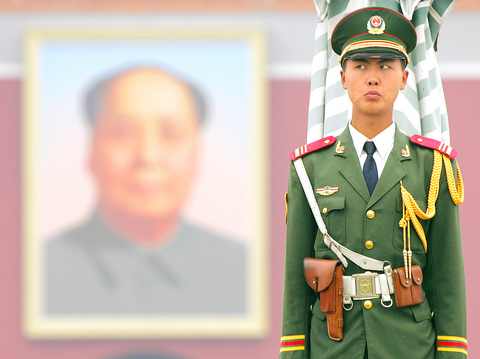Under the watchful eye of the Chinese police, citizens who lost relatives in the 1989 Tiananmen massacre were preparing low-key ceremonies for today's 17th anniversary of the crackdown.
Zhang Xianling (張先玲), a Beijing woman whose son would now have been 36 if he had not killed by an army bullet on the fateful night of June 4, 1989, planned to go to the Wan'an Cemetery in the west of the capital.
"Every year on June 4, relatives of the victims gather together at the cemetery," she said.

PHOTO: AP
"We all feel very sad and try to comfort each other. Of course, the police are always there," Zhang said.
She said police behavior at the cemetery had become more brazen in recent years, as plain-clothes officers had been replaced with officers in full uniform, often openly filming the memorial ceremonies.
China's state-controlled media on yesterday entirely ignored the approach of the anniversary, reflecting the authorities' determination to let yet another year pass without incident.
Jiang Peikun (
When his wife, Ding Zilin (丁子霖), left for pneumonia treatment at a local hospital early yesterday, they followed her every step of the way, he said.
"Every year police call us and other relatives to ask when and where we plan to go," Jiang said.
Outside Beijing, quiet ceremonies were also being prepared by people refusing to forget.
One of them was Lin Mu (林牧), the former secretary of 1980s reformist Communist Party leader Hu Yaobang (胡耀邦).
"I don't have special activities planned outside, but I do intend to hold a memorial ceremony at home," said Lin, now a prominent dissident voice.
He said that for him, the injustice of 1989 reverberated in today's modernizing Chinese society.
"Apart from June 4, there are a lot of other problems in China, like human rights," he said.
"There are a lot of rights infringement cases in China. The government says it is pursuing a `people first policy,' but it's just talk, and it's not really followed up by any action."
Hundreds, if not thousands, of unarmed protesters and citizens were gunned down in the streets of Beijing when the People's Liberation Army moved in to quell six weeks of democracy protests in 1989.
The government has insisted to this day that the decision to quell what it called "the counter-revolutionary rebellion" paved the way for 17 years of robust economic growth.
Nothing suggests that this verdict will change anytime soon, but Lin Mu said he was optimistic about the future of human rights in the world's most populous country.
"More people than before strive for their rights, and it happens in all walks of life," he said. "As for June 4, I'm confident it will be correctly dealt with in the future, I just don't know when."
While the nation's Communist rulers have brought material welfare to unprecedented numbers of Chinese, many still harbor bitterness over the events of June 1989.
Zhang Xianling described how her son was left helpless and bleeding after he was shot by military forces advancing down Chang'an Avenue in the early hours of June 4.
"Although he was shot in the head, he didn't die immediately," she said. "But the troops didn't allow doctors and students to reach him and save him."

In the sweltering streets of Jakarta, buskers carry towering, hollow puppets and pass around a bucket for donations. Now, they fear becoming outlaws. City authorities said they would crack down on use of the sacred ondel-ondel puppets, which can stand as tall as a truck, and they are drafting legislation to remove what they view as a street nuisance. Performances featuring the puppets — originally used by Jakarta’s Betawi people to ward off evil spirits — would be allowed only at set events. The ban could leave many ondel-ondel buskers in Jakarta jobless. “I am confused and anxious. I fear getting raided or even

Kemal Ozdemir looked up at the bare peaks of Mount Cilo in Turkey’s Kurdish majority southeast. “There were glaciers 10 years ago,” he recalled under a cloudless sky. A mountain guide for 15 years, Ozdemir then turned toward the torrent carrying dozens of blocks of ice below a slope covered with grass and rocks — a sign of glacier loss being exacerbated by global warming. “You can see that there are quite a few pieces of glacier in the water right now ... the reason why the waterfalls flow lushly actually shows us how fast the ice is melting,” he said.

Eleven people, including a former minister, were arrested in Serbia on Friday over a train station disaster in which 16 people died. The concrete canopy of the newly renovated station in the northern city of Novi Sad collapsed on Nov. 1, 2024 in a disaster widely blamed on corruption and poor oversight. It sparked a wave of student-led protests and led to the resignation of then-Serbian prime minister Milos Vucevic and the fall of his government. The public prosecutor’s office in Novi Sad opened an investigation into the accident and deaths. In February, the public prosecutor’s office for organized crime opened another probe into

RISING RACISM: A Japanese group called on China to assure safety in the country, while the Chinese embassy in Tokyo urged action against a ‘surge in xenophobia’ A Japanese woman living in China was attacked and injured by a man in a subway station in Suzhou, China, Japanese media said, hours after two Chinese men were seriously injured in violence in Tokyo. The attacks on Thursday raised concern about xenophobic sentiment in China and Japan that have been blamed for assaults in both countries. It was the third attack involving Japanese living in China since last year. In the two previous cases in China, Chinese authorities have insisted they were isolated incidents. Japanese broadcaster NHK did not identify the woman injured in Suzhou by name, but, citing the Japanese